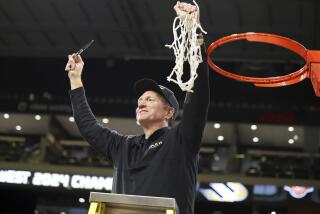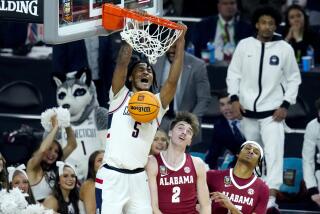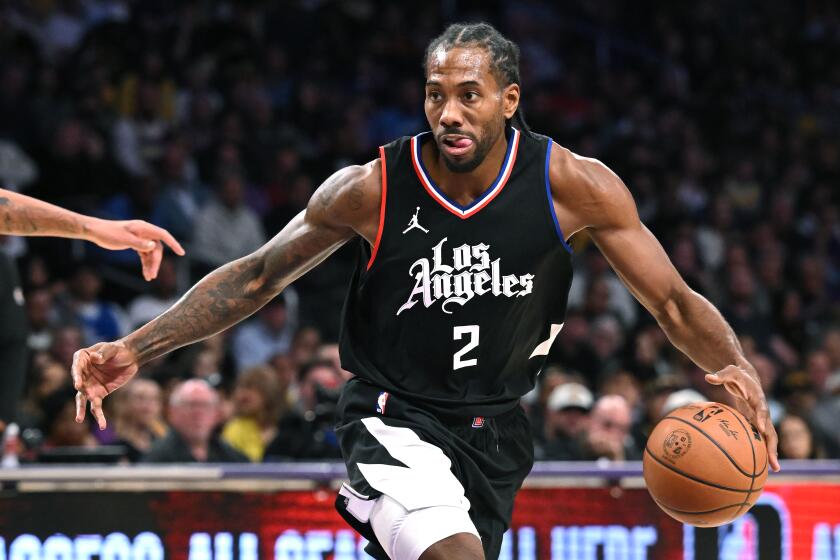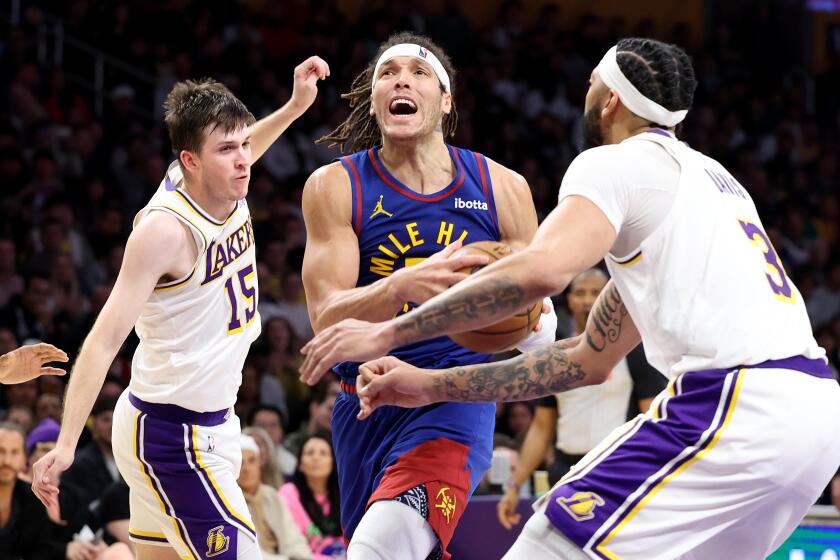Column: Wisconsin Final Four team has a family tree with deep coaching roots
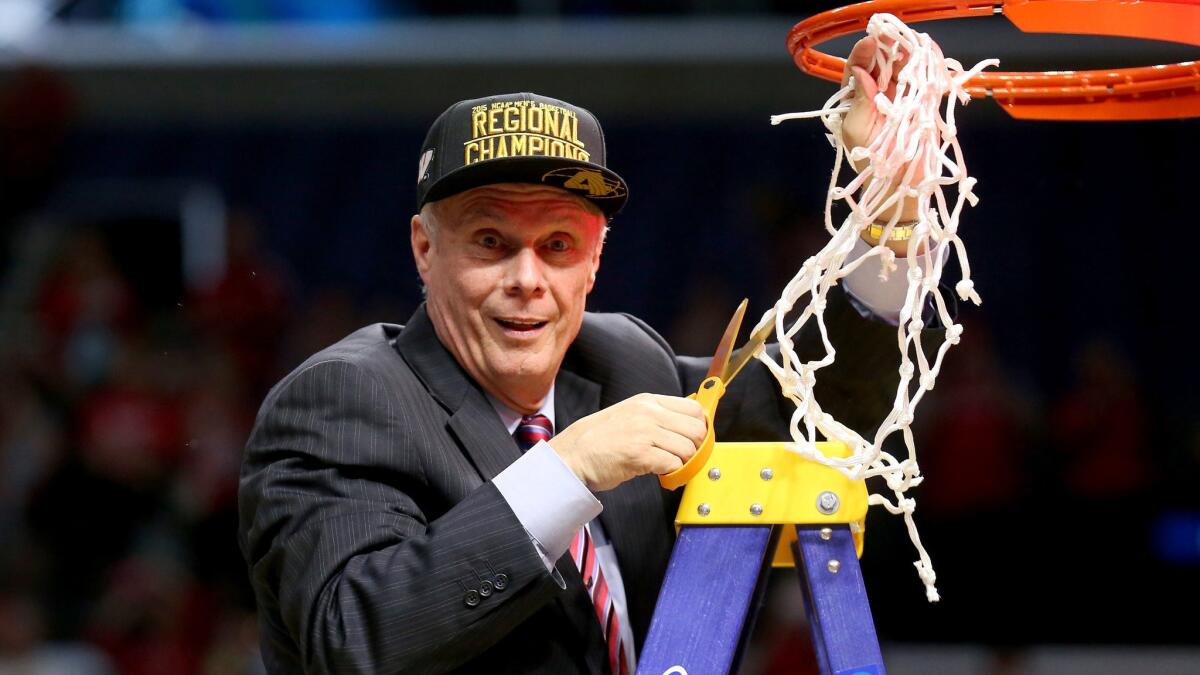
Wisconsin Coach Bo Ryan cuts down the net after the Badgers’ victory over Arizona in the NCAA tournament West Region final at Staples Center on Saturday.
As the Wisconsin Badgers embark on a mission not impossible in the NCAA Final Four on Saturday, it might be useful, as you watch, to understand their roots.
They are a mosaic of hand-me-downs.
Their game against Kentucky, 38-0 and presumably unbeatable, may be seen as a morality play.
It will match Kentucky’s hired guns, players who arrive in Lexington more for an audition with the NBA than for a marketing degree, against a Wisconsin team that has aged like fine wine.
This is a game of the one-and-dones versus the stay-and-plays.
The debate over the annual construction of Kentucky’s team will rage on. The letters N-C-A-A, as the sanctioning body of this, will be invoked in anger many times. These days, those letters invoke little else.
More interesting, although more nuanced and subtle, is the construction of the Badgers.
They are the product of Coach Bo Ryan, a 67-year-old maestro with a clipboard.
He is in his 14th season in Madison, and his record is 356-124. Saturday’s game will be Wisconsin’s second straight Final Four appearance, half of the school’s history. Coach Bud Foster won the national title in 1941, and the Badgers’ only other trip was in 2000.
So who is Ryan, and why is he the way he is?
Think of his family tree as including the following: Ken Anderson, Dick Bennett, Al McGuire and Rick Majerus.
Anderson coached 27 years at UW-Eau Claire. He is 82 and recently had the basketball court at Eau Claire named for him. He made it to two NAIA title games and has the second-best winning percentage in college basketball at .806, behind Adolph Rupp and ahead of John Wooden.
In 1982, Anderson was named Wisconsin’s basketball coach. He went to the press conference — Athletic Director Elroy Hirsch was on a cruise and not there — and when Anderson’s name was mispronounced and the proceedings generally botched, Anderson said no thanks and went back to Eau Claire.
The Wisconsin team that made the Final Four in 2000 was coached by Bennett, now 71. Before taking over the big-school program in Madison, Bennett had coached at UW-Stevens Point and later UW-Green Bay.
Ryan’s early success came in the same conference, and at the same levels as Anderson and Bennett. He coached at UW-Platteville — the court there is named for him — and won four NCAA Division III titles. Bennett was a man so driven that he would often get physically ill before games, and when he caved to the pressure, he was eventually replaced by Ryan, who had revived the program at UW-Milwaukee.
All three understood the roots of their core product.
Future high school basketball stars in Wisconsin shovel snow off driveways and shoot jump shots in 10-degree weather. Their mind-set is blue collar. They know Hollywood as a sign on a hill, with no thoughts of ever seeing it. They don’t work much on reverse dunks, because those are hard in long underwear and parkas.
Instead, they learn to grind it out, move their feet on defense, share the ball and stick their butts into somebody when a shot goes up.
Anderson, Bennett and Ryan enforced all this, made it the necessity and the only chance against those who jump higher and run faster. They seldom had the best players, but they always made the best of the players they had.
Then along came McGuire.
As Marquette’s glib-talking, transplanted New Yorker, he brought rivalry and hate to Badgers and Badgers fans. McGuire knew the game, recruited great players — often the kind UW couldn’t get — and was fun, slightly crazy and always controversial.
After one controversial Marquette win over UW, a celebrating McGuire got up on the scorer’s table, raised his arms and clenched his fists to the Wisconsin crowd. The stars of that UW team were 6-foot-11 twins Kim and Kerry Hughes. In the crowd, their father responded to McGuire with a raised middle finger. A photographer from the local newspaper got the shot, and the young sports editor who ran the picture was called to the principal’s office the next day.
Kim Hughes, an assistant coach with the Portland Trail Blazers, was the man who took over for a departing Mike Dunleavy for 33 games as Clipper coach in 2010.
Majerus, eventually a young McGuire assistant, had tried out as a player at Marquette and was cut because McGuire said “he was terrible.” As a coach, he validated much of what Wisconsin basketball had, and has, become. Well before he became famous and took Utah to national prominence and the NCAA final in 1998, he was a drill sergeant on Milwaukee’s playgrounds.
Fundamentals were obsessively taught. If you didn’t screen out, you sat. If you couldn’t make 20 free throws in a row, you shot 20 more. Angles of picks were 10-minute discussions.
It was Majerus who was the other main candidate when Ryan got the UW job in 2001. It was Majerus who devised the triangle-and-two that shut down Arizona’s Lute Olson and his star guards, Mike Bibby and Miles Simon, in the 1998 West Regional final at Anaheim.
And now, the last two years, it has been more Badger state karma that has destroyed yet another great Arizona team in a second-straight West Regional final in greater Los Angeles.
Majerus went on that year to lose the 1998 final, after leading late in the game, to the team he despised most, the team that always ruined his ultimate successes.
Who else? Kentucky.
Guess who beat the Badgers in the Final Four last year?
Whatever happens Saturday, Wisconsin’s basketball coaching family tree will continue to influence. Virginia’s Tony Bennett, whose team was 30-4, was named coach of the year by the U.S. Basketball Writers.
He is a former point guard at UW-Green Bay, a grind-it-out, share-the-ball, unyielding defender.
He is also Dick Bennett’s son.
Twitter: @DwyreLATimes
More to Read
Get our high school sports newsletter
Prep Rally is devoted to the SoCal high school sports experience, bringing you scores, stories and a behind-the-scenes look at what makes prep sports so popular.
You may occasionally receive promotional content from the Los Angeles Times.

